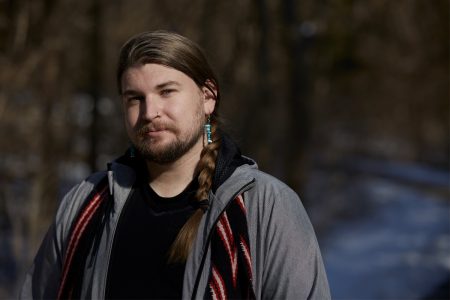Student newspaper editor files federal lawsuit against Haskell president

photo by: Gary Rohman / FIRE
Haskell Indian Nations University student Jared Nally
Updated at 5:27 p.m. Tuesday
The editor of the student newspaper at Haskell Indian Nations University filed a federal lawsuit on Tuesday against the university and its president, as well as the Bureau of Indian Education and its director.
The lawsuit, filed by student editor Jared Nally, comes after Haskell’s president, Ronald Graham, sent a directive to Nally in October that told the student journalist what he could and could not publish.
“That directive forbade regular acts of journalism and restricted free speech expression, and the purpose of the lawsuit is to reaffirm that Haskell students have that,” Nally said in a phone interview with the Journal-World on Tuesday. The Haskell senior is looking for a legal ruling to state that what happened was unconstitutional.
In the lawsuit, Nally also requests that the university answer for the 90 days in which he alleges he was silenced by the administration, that it restore $10,000 of funding that the student editor alleges the newspaper was shorted, that it approve the newspaper’s registration as a student organization and that it revise a campus speech policy that Nally alleges is unconstitutional. Nally is being financially backed in his lawsuit by the Foundation for Individual Rights in Education, also known as FIRE, a nonprofit that focuses on protecting free speech rights on college campuses.
Graham did not respond to a request for comment regarding the lawsuit. Klarissa Jensen, a spokesperson for the Bureau of Indian Education, said the department could not comment because “the matter is an active litigation.”
As the Journal-World has reported, in October, Nally received a directive from Graham that demanded Nally not attack any students, faculty or staff members with letters or in public; make demands of any governmental agency while claiming to represent the student newspaper, The Indian Leader; attempt to countermand decisions of Haskell personnel; or record anyone at Haskell in interviews unless first advising them and receiving their permission.
The directive was met with opposition from FIRE, the Native American Journalists Association and the Student Press Law Center, who wrote in a letter to Graham that the directive violated the First Amendment.
It was not until Jan. 13, 2021, that Nally received an undated letter from Graham, who rescinded his directive and admitted the university “took an incorrect approach” in sending out the directive.
In an email to Nally on Jan. 13, Graham wrote that he had sent his response letter to the Bureau of Indian Education on Nov. 20, 2020, but that he just learned on Jan. 13 that it was never sent to Nally because of “an administrative mishap.” Graham apologized for the delay in delivery.
On Jan. 19, FIRE filed a complaint against Haskell to the U.S. Department of Education, writing that the “delay led to an inexcusable and unconstitutional chilling effect on Nally and the Leader’s expressive rights.”
Nally said Tuesday that Graham’s letter that rescinded the directive “wasn’t enough to protect my rights or future rights” of other student journalists at Haskell.
“I want to keep moving that needle forward on our rights, and I think just accepting that letter moves that needle back,” he said.
Nally said that despite being asked for approval in September, Haskell has still not approved the Indian Leader as a student organization this school year. Additionally, the lawsuit alleges that the student newspaper has not been receiving the correct amount of funding. Nally said that the Indian Leader has received one third of total Student Activity Fees since its 1989 Settlement Agreement with what was then Haskell Indian Junior College. In 2020, however, Nally said he has received over $10,000 less than anticipated.
Additionally, Nally wants Haskell’s Student Code of Conduct to be amended so that future students cannot be silenced based on its “CIRCLE” values: Communication, Integrity, Respect, Collaboration, Leadership and Excellence.
As previously reported, representatives from FIRE, the Native American Journalists Association and the Student Press Law Center have requested that the student code be revised to accord with the First Amendment. The groups said the CIRCLE acronym presents “laudable goals” but restricts student expression rights. They say the university cannot mandate “respect,” for example, without “departing from its obligations under the First Amendment.”
In his October directive to Nally, Graham brought up the Student Code of Conduct when he wrote that Nally must treat fellow students, staff and university officials with respect, or else be faced with potential disciplinary action.
On Tuesday, Nally emphasized the importance of protecting free speech rights on campus, especially at Haskell.
“I think an important thing to note and to contextualize is that many tribal nations don’t really have the same free speech expression rights in their tribal communities, and so it’s really important when all these students from tribal nations come to Haskell that they see and understand that they have these rights,” Nally said. “I think it is absolutely critical that our school maintain student rights for that reason.”







